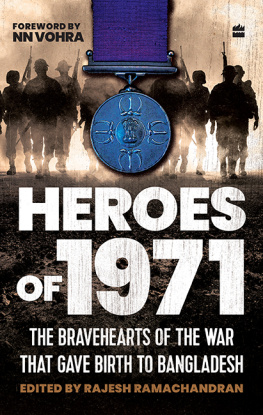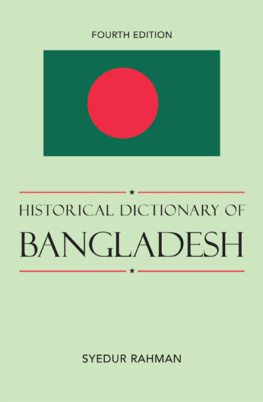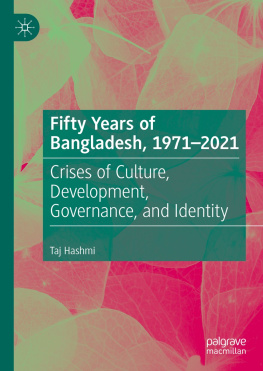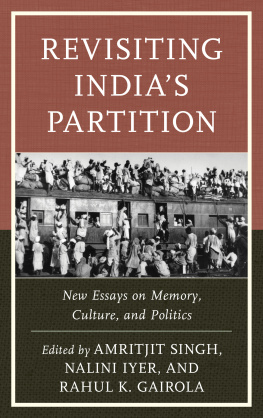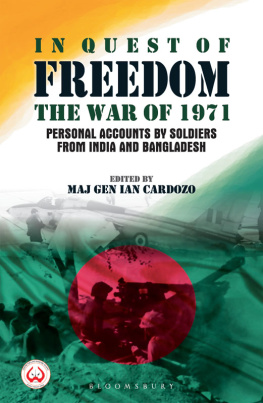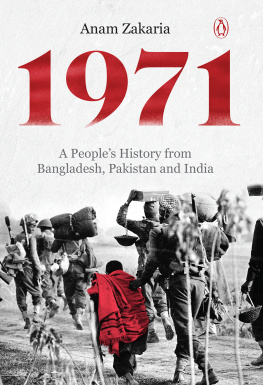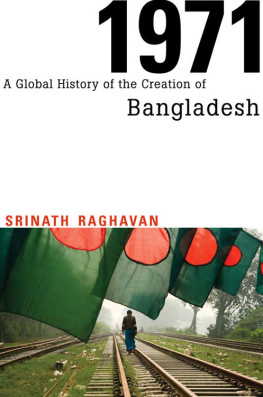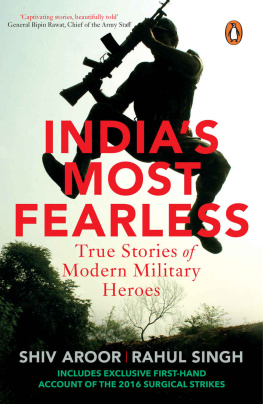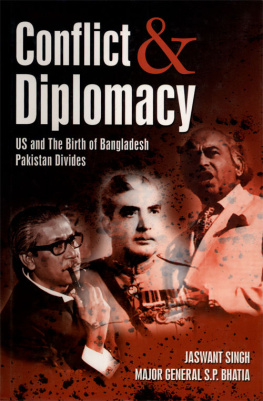Table of Contents


Dedicated to all our brave men in uniform and the unsung heroes who laid down their lives to safeguard our country
Contents


Foreword
B RITISH India was partitioned in August 1947 and two free nations were born: India and Pakistan. India celebrates its Independence Day on 15 August every year, and for Pakistan, it is a day earlier. While India chose to form itself into a sovereign socialist secular republic, our neighbour declared itself as the Islamic Republic of Pakistan. In the months preceding and during the Partition, millions of innocent people were killed in the gruesome communal violence that engulfed the subcontinent. Over 20 million were rendered homeless.
The interim government of India, our first national government, worked day and night to restore law and order across the vast territory from Bengal to Punjab, establishing hundreds of refugee camps to provide shelter, food, clothing and medical care to the millions who had fled from the areas which were to now form the territory of Pakistan. In the midst of this highly disturbed situation, Pakistan, barely a few weeks old as a nation, mobilized armed tribal groups, trained and led by Pakistan army officers out of uniform, and invaded the princely Indian state of Jammu and Kashmir with the objective of seizing it. After months of debate in the United Nations (UN), Pakistans naked aggression was brought to a stop in late 1948, and the demarcated ceasefire line became effective from July 1949. Over seventy years have since elapsed, and Pakistan religiously continues to pursue its avowed goal of delivering a thousand cuts to dismember India and take Kashmir.
In the early 1950s, at the persuasion of the US, Pakistan joined two security pacts, Southeast Asia Treaty Organization (SEATO) and Central Treaty Organization (CENTO), which enabled it to receive Americas continuing support for strengthening and enlarging its military capabilities. Needless to say, this arrangement provided the US the opportunity to have a presence in Pakistan and exercise growing influence over its defence and foreign policies. Meanwhile, India eschewed involvement in any security-related agreements with other countries and remained firmly committed to its policy of seeking peaceful and friendly relations with all its neighbours.

In 1965, Pakistan launched Operation Gibraltar with the objective of infiltrating trained terrorists in large numbers into J&K and perpetrating a massive insurgency, which they thought would ensure Indias ouster from Kashmir. While this adventure failed, Pakistan continued its cross-border skirmishes, which finally led to the 1965 war with India. The hostilities ended with a UN Security Council (UNSC)-enabled ceasefire, followed by the Tashkent Declaration, which was engendered by the diplomatic intervention of the Soviet Union. India agreed to the ceasefire when it was in occupation of over 1,900 sq. km of enemy territory. However, Pakistan claimed victory over India and widely drummed that it had won the backing of the entire international community in countering Indias aggression.

While India had, since Independence, remained intensively engaged in tackling the challenges of nation-building and placing its democratic framework on a firm footing, the governance of Pakistan had, since 1958, firmly settled in the hands of its military generals, who were openly opposed to democracy.

Pakistans eastern wing, East Pakistan, lay 1,600 km away from West Pakistan. In terms of growth and development, it had suffered adversely for many years because of the highly discriminatory policies of the federal government of Pakistan, which had refused to provide the much-needed political and economic support to East Pakistan. As unashamedly pronounced by the commanding Pakistani generals, one of the reasons for their harsh treatment of the people of East Bengal was because they were not Urdu but Bengali speaking, and worse still, followed socio-cultural practices which were common with those practised by the people living in the neighbouring states of India. Briefly, they were saying that because the people of East Pakistan spoke Bengali and conformed to socio-cultural traditions followed by Hindus in India, the people of East Pakistan were to be considered as infidels who did not deserve to be treated as Pakistanis and, as such, deserved to be given the boot.
Elections to the Pakistan National Assembly, held in December 1970, had resulted in the Awami League, the main political party in East Pakistan led by Sheikh Mujibur Rahman, sweeping the polls. At that time, Pakistan was ruled by President Yahya Khan. Notwithstanding the clear victory of the Awami League, Yahya Khan ensured that Sheikh Mujibur Rahman was denied the opportunity to form the next government. This objective was secured, inter alia, by repeatedly postponing the date for convening the National Assembly. In early March 1971, the Pakistan government brazenly announced that the National Assembly would not be convened for an indefinite period. This unconstitutional decision triggered violent protests and riots across the length and breadth of East Bengal, whose people had suffered discrimination and endless atrocities for far too long and their patience had been exhausted. This fresh wave of protests by the oppressed people marked the beginning of the freedom movement in East Bengal.
In end March 1971, to bring East Bengal under tighter control and to teach its people a lesson, General Tikka Khan, Chief of Pakistan Armys Eastern Command, launched Operation Searchlight. The ensuing crackdown all over East Bengal led to the Pakistani military indulging in arson, rape, loot and large-scale genocidal massacres, for which Tikka Khan came to be known as the Butcher of Bangladesh. The wave of terror created by the genocidal killings led to people fleeing their homes to save their lives. This triggered a massive exodus to the neighbouring Indian states, and by the end of November 1971, nearly 10 million Bangladeshis had crossed over to India. This enormous influx caused serious political, economic and security problems for the host states in India. The government of India made continuing diplomatic attempts, through various possible channels, to secure an arrangement with Pakistan under which these refugees could return home on their own terms (and not on any proposed by India). All its efforts failed. India was faced with a grave financial crisis, and besides, serious security problems; a rapidly increasing number of incidents of sabotage, subversion and communal tension were being perpetrated by Pakistani Inter-Services Intelligence (ISI) agents, who had succeeded in crossing over by mingling with the large groups of Bangladeshis who had entered India.
The situation in East Pakistan continued to remain highly disturbed. The ranks of the Mukti Bahini, a militant organization which had emerged to liberate East Pakistan, were strengthened by a large number of patriotic elements who deserted the Pakistan army and paramilitary forces to join the Bangladeshi freedom movement. The Mukti Bahini provided invaluable strength to the freedom struggle by imparting military training to a large number of volunteers from among the people. These trained persons were formed into small fighting units, which successfully carried out guerrilla attacks to destroy roads and bridges, communication centres and vital military installations.

